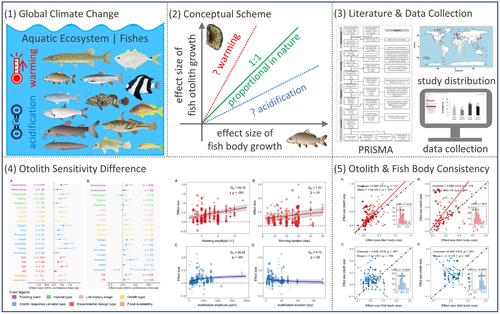当前位置:
X-MOL 学术
›
Glob. Change Biol.
›
论文详情
Our official English website, www.x-mol.net, welcomes your
feedback! (Note: you will need to create a separate account there.)
Otolith reliability is context‐dependent for estimating warming and CO2 acidification impacts on fish growth
Global Change Biology ( IF 10.8 ) Pub Date : 2024-09-06 , DOI: 10.1111/gcb.17501 Bangli Tang 1 , Liuyong Ding 1 , Chengzhi Ding 1, 2, 3, 4 , Dekui He 5 , Haojie Su 6 , Juan Tao 1, 2, 4
Global Change Biology ( IF 10.8 ) Pub Date : 2024-09-06 , DOI: 10.1111/gcb.17501 Bangli Tang 1 , Liuyong Ding 1 , Chengzhi Ding 1, 2, 3, 4 , Dekui He 5 , Haojie Su 6 , Juan Tao 1, 2, 4
Affiliation

|
Otoliths are frequently used as proxies to examine the impacts of climate change on fish growth in marine and freshwater ecosystems worldwide. However, the large sensitivity differences in otolith growth responses to typical changing environmental factors (i.e., temperature and CO2 concentration), coupled with unclear drivers and potential inconsistencies with fish body growth, fundamentally challenge the reliability of such otolith applications. Here, we performed a global meta‐analysis of experiments investigating the direct effects of warming (297 cases) and CO2 acidification (293 cases) on fish otolith growth and compared them with fish body growth responses. Hierarchical models were used to assess the overall effect and quantify the influence of nine explanatory factors (e.g., fish feeding habit, life history stage, habitat type, and experimental amplitude and duration). The overall effects of warming and acidification on otolith growth were positive and significant, and the effect size of warming (effect size = 0.4003, otolith size of the treatment group increased by 49.23% compared to that of the control group) was larger than that of acidification (0.0724, 7.51%). All factors examined contributed to the heterogeneity of effect sizes, with larger responses commonly observed in carnivorous fish, marine species, and young individuals. Warming amplitudes and durations and acidification amplitudes increased the effect sizes, while acidification durations decreased the effect sizes. Otolith growth responses were consistent with, but greater than, fish body growth responses under warming. In contrast, fish body growth responses were not significant under acidification (effect size = −0.0051, p = .6185) and thus cannot be estimated using otoliths. Therefore, our study highlights that the reliability of applying otoliths to examine climate change impacts is likely varied, as the sensitivity of otolith growth responses and the consistency between the growth responses of otoliths and fish bodies are context‐dependent.
中文翻译:

耳石可靠性在估计变暖和二氧化碳酸化对鱼类生长的影响时取决于具体情况
耳石经常被用作研究气候变化对全球海洋和淡水生态系统鱼类生长影响的替代指标。然而,耳石生长对典型变化的环境因素(即温度和二氧化碳浓度)的敏感度差异很大,加上驱动因素不明确以及与鱼体生长的潜在不一致,从根本上挑战了此类耳石应用的可靠性。在这里,我们对实验进行了全球荟萃分析,调查了变暖(297例)和二氧化碳酸化(293例)对鱼类耳石生长的直接影响,并将其与鱼体生长反应进行了比较。使用分层模型来评估总体效果并量化九个解释因素(例如鱼类摄食习惯、生活史阶段、栖息地类型以及实验幅度和持续时间)的影响。升温和酸化对耳石生长的总体影响是正向且显着的,且升温效应大小(效应大小=0.4003,处理组耳石大小较对照组增加49.23%)大于对照组酸化(0.0724,7.51%)。所有检查的因素都会导致效应大小的异质性,在肉食性鱼类、海洋物种和幼年个体中通常观察到较大的反应。变暖幅度和持续时间以及酸化幅度增加了效应大小,而酸化持续时间降低了效应大小。耳石生长反应与变暖条件下鱼体生长反应一致,但大于鱼体生长反应。相反,鱼体生长反应在酸化下并不显着(效应大小= -0.0051,p = .6185),因此无法使用耳石进行估计。 因此,我们的研究强调,应用耳石来检查气候变化影响的可靠性可能会有所不同,因为耳石生长反应的敏感性以及耳石和鱼体生长反应之间的一致性取决于环境。
更新日期:2024-09-06
中文翻译:

耳石可靠性在估计变暖和二氧化碳酸化对鱼类生长的影响时取决于具体情况
耳石经常被用作研究气候变化对全球海洋和淡水生态系统鱼类生长影响的替代指标。然而,耳石生长对典型变化的环境因素(即温度和二氧化碳浓度)的敏感度差异很大,加上驱动因素不明确以及与鱼体生长的潜在不一致,从根本上挑战了此类耳石应用的可靠性。在这里,我们对实验进行了全球荟萃分析,调查了变暖(297例)和二氧化碳酸化(293例)对鱼类耳石生长的直接影响,并将其与鱼体生长反应进行了比较。使用分层模型来评估总体效果并量化九个解释因素(例如鱼类摄食习惯、生活史阶段、栖息地类型以及实验幅度和持续时间)的影响。升温和酸化对耳石生长的总体影响是正向且显着的,且升温效应大小(效应大小=0.4003,处理组耳石大小较对照组增加49.23%)大于对照组酸化(0.0724,7.51%)。所有检查的因素都会导致效应大小的异质性,在肉食性鱼类、海洋物种和幼年个体中通常观察到较大的反应。变暖幅度和持续时间以及酸化幅度增加了效应大小,而酸化持续时间降低了效应大小。耳石生长反应与变暖条件下鱼体生长反应一致,但大于鱼体生长反应。相反,鱼体生长反应在酸化下并不显着(效应大小= -0.0051,p = .6185),因此无法使用耳石进行估计。 因此,我们的研究强调,应用耳石来检查气候变化影响的可靠性可能会有所不同,因为耳石生长反应的敏感性以及耳石和鱼体生长反应之间的一致性取决于环境。































 京公网安备 11010802027423号
京公网安备 11010802027423号